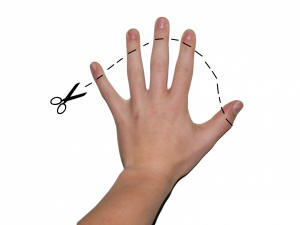On declawing cats
Jennifer Vanderau
Cumberland Valley Animal Shelter
 (1/2014) We've had more than one story in the recent past where people have adopted a cat, had him or her declawed and returned the cat not long after because the "personality" had changed.
(1/2014) We've had more than one story in the recent past where people have adopted a cat, had him or her declawed and returned the cat not long after because the "personality" had changed.
Man, that frustrates me, so I want to talk about the nature of cats.
In the wild, a cat will use his claws as a defense mechanism. I actually think it's almost ingrained in the psyche of a cat. "My claws are my weapons and will keep me safe."
In fact, wild cats will use their claws for a wide variety of feats. Climbing, for one. Cats can make their way up just about any object, as long as they can dig in with their claws.
Balance is crucial to cats because they are constantly jumping and landing rather gracefully. Claws, believe it or not, are a pretty big factor a cat's ability to balance properly.
Cats in the wild use their claws to tear apart food, so they can eat. Claws are also used to mark territory, so predators and other cats will know to stay away.
Cats get a real sense of power from their claws. They are weapons, utensils, climbing mechanisms and even stabilizers.
To take this away from a cat should be a decision that is not made lightly. Declawing is something every pet owner needs to contemplate for themselves. While it's illegal in the UK, it is not illegal in the United States.
With that said, none of my felines are declawed and yes, I have the evidence on the furniture to prove it. I have spoken to a number of people over the years who are vehemently opposed to declawing and if you google what the operation actually looks like on a cat's paw, the photos are stomach-turning.
I don't agree with it and I would never do it to my cats, but because it's not illegal, I can't stop others from making the decision.
But -- and truly, you had to hear that coming from a mile away -- if you do opt to have the procedure done, please understand it could alter the behavior of the cat. And these changes could emerge even months after the procedure.
Removing a cat's claws will sometimes mean that a cat will look to other parts of the body for "weapons." A lot of cats who have been declawed will bite much more than they did before the procedure and sometimes the biting can be quite intense.
Some cats won't be as apt to jump or play because their balance has been changed. Some cats may not be as affectionate as before.
Bathroom habits can most definitely be affected. The litter granules may feel odd on a paw with no claws and as a result, the cat could very easily stop using the litterbox.
Change of any kind is difficult for cats. They are one of the most sensitive creatures I know -- and I mean that quite sincerely. Altering any part of the routine can send some cats into a tailspin.
I hung a picture my sister got me for Christmas last year and one of my youngest cats, Dee Dee, who had no idea of the change in the room, walked in, looked right up at the picture, jumped to the headboard of the bed and started slapping at it.
I kid you not, it freaked me out that she even realized something was different.
Being realistic, I have to say declawing doesn’t necessarily negatively affect every cat. I know some people who've had the procedure done and have had no problems at all. And if you have declawed cats, please don't take this column as a renouncement of your pet-lover status. It's truly not.
It's just those who would then give up a declawed cat that get to me.
Here's the thing. If, as pet owners, we decide to have a cat declawed, we should also be fully willing and ready to accept any changes that it can bring about. If we do something to alter the physical make-up of our pets -- and truly, most declawing is done to protect a human being's furniture (there is absolutely no health reason to
declaw a cat) -- then we need to accept the consequences.
I would be remiss in not adding here that a declawed cat should never -- and I truly mean NEVER -- be allowed outside. Taking away a cat's only line of defense and then letting him out into the elements is just awful.
Declawing a cat and returning him to the shelter because he's "changed" and "different" is equally galling and incomprehensible to me.
As a society in general, I often wish we would take responsibility for our actions more than we do.
As pet owners, I think it should be a requirement. If you declaw a cat, keep him inside and be willing to handle whatever fallout might arise for the rest of his life. If you make such a monumental decision for a being completely dependent on you, please don't then abandon him when the procedure has negative affects or brings about
behaviors you don't like.
After changing his life so drastically, you owe your little feline at least that much consideration.
*****
Jennifer Vanderau is the Director of Communications for the Cumberland Valley Animal Shelter in Chambersburg, Pa., and can be reached at cvasoc@innernet.net. The shelter accepts both monetary and pet
supply donations. For more information, call the shelter at (717) 263-5791 or visit the website www.cvas-pets.org.
Read other articles by Jennifer Vanderau